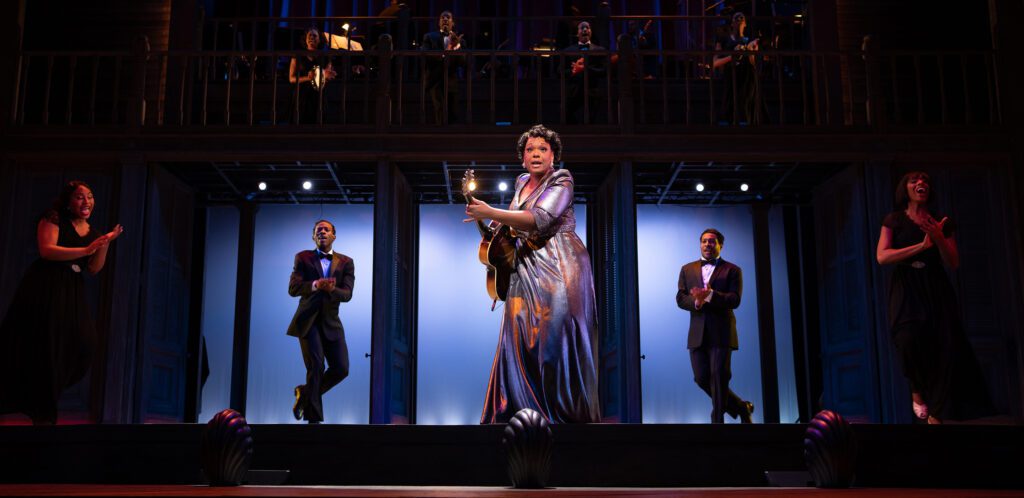‘Shout Sister Shout!’ at Ford’s Theatre Brings Audiences on a Rollercoaster of Successes, Sorrows
By • April 6, 2023 0 1017

Settling into a seat for “Shout Sister Shout!” at Ford’s Theatre, one expects to hear a voice capable of raising the historic rafters: that of Carrie Compere as “Godmother of Rock and Roll” Sister Rosetta Tharpe.
That happens, but the stunning surprise is that two other cast members hit Compere’s high bar: Carol Dennis, playing Tharpe’s mother, Katie Bell; and Felicia Boswell, playing her musical and romantic partner, Marie Knight.
Though each sings with Compere — “Didn’t It Rain,” her serene second-act duet with Boswell, is a standout — we don’t get to hear all three together. Why not? Because that rift is key to the storyline.
As a girl, Tharpe — then known as Little Rosetta Nubin — joined her mother, a deaconess of the Black Pentecostal Church of God in Christ, to belt out gospel in a traveling evangelical troupe.
But her mother rejected Tharpe when her precocious talent attracted a white agent (“Richie” in the play, breezily portrayed by Joe Mallon), who booked her into secular venues, notably Harlem’s Cotton Club and, in 1938, Carnegie Hall, for John Hammond’s legendary “Spirituals to Swing” concert. Both appearances are depicted with flair onstage.
“The only place you need to be singing is in the church,” says Dennis as Bell, who pulls away more than once from her daughter’s embrace.
Neither could her fundamentalist mother accept Tharpe’s same-sex relationship with Knight. More heartbreak: after three years of performing and living together, Knight left Tharpe in 1949, convinced that the death in a house fire of her children and mother (who was caring for them) was God’s punishment for her lesbianism. “Don’t touch me,” she tells Tharpe, woundingly adding: “There should have never been a ‘we’ in the first place.”
Cheryl L. West’s adaptation of a 2007 biography by Gayle F. Wald, “Shout Sister Shout!” is having its East Coast premiere at Ford’s through May 13. Directed by Kenneth L. Roberson with music direction by Sheilah V. Walker and choreography by William Carlos Angulo, the production covers four decades — from 1933 to the singer’s death in 1973 at the age of 58 — staging some 20 songs, nearly half written by Tharpe, along the way.
This leaves little time for non-musical exposition: mostly brief scenes of Tharpe’s personal and professional conflicts as she blazed an unconventional trail. Crossing over from gospel to blues and jazz in the late 1930s, she was one of the first women to perform on electric guitar and among the first guitarists to incorporate distortion.
Tharpe inspired Little Richard, Chuck Berry, Elvis Presley, Johnny Cash and — after a 1964 appearance with Muddy Waters in Manchester — British rockers such as Eric Clapton; she was inducted into the Rock and Roll Hall of Fame as an “Early Influence” in 2018.
Along with its three vocal stars, essential to the show’s success is the eight-piece pit band (actually positioned in a balcony level above the stage) led by keyboardist Victor Simonson, with guitarist Gerry Kunkel, a University of Maryland faculty member, providing the sounds that seem to come from Compere’s guitars. Often in the role of a concert crowd, the audience needs little encouragement to clap along and applaud.
The hard-working ensemble sings and dances in a variety of guises: as the Praise Brothers quartet, as street musicians, as showgirls and as Tharpe’s backup singers the Rosettes. Individual cast members pop up as Cab Calloway, Dizzy Gillespie, Mahalia Jackson and the Rev. Thomas Tharpe, Rosetta’s unsympathetic and apparently abusive first husband.
In the last scene, after a compressed lifetime of successes, sorrows and setbacks, Tharpe appears in a wheelchair in a red wig, her sheath dress covering where one leg was amputated due to post-stroke complications from diabetes. Her parting advice: “Live like someone loves you.”

